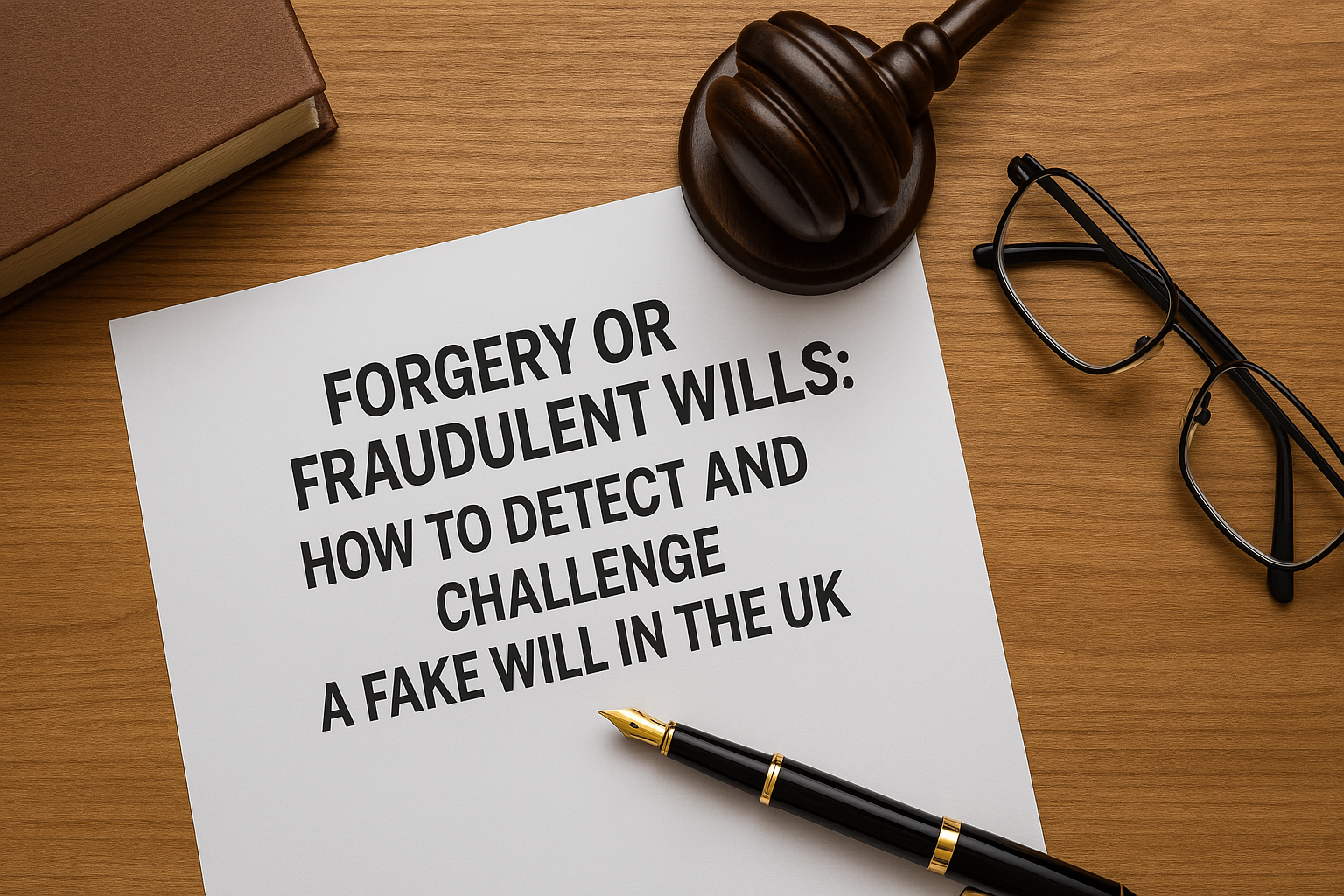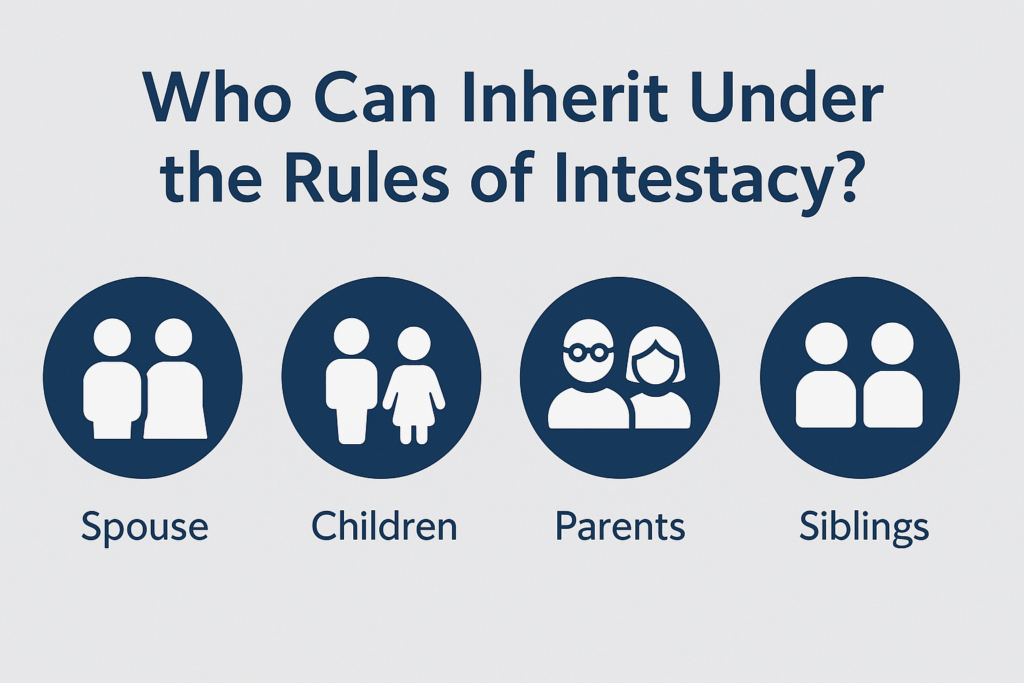In the United Kingdom, the legitimacy of a will is paramount in ensuring that a deceased person’s estate is distributed according to their genuine intentions.
Unfortunately, will forgery and fraudulent wills are not uncommon, especially when significant assets are at stake.
If you suspect a will has been forged or fraudulently altered, acting decisively is essential, backed by legal insight and procedural knowledge.
What Constitutes a Forged or Fraudulent Will in the UK?
A forged will is one that has been created, altered, or signed without the valid consent of the testator—the person making the will. This includes scenarios where:
Someone else signs the will pretending to be the testator.
The signature is forged.
Pages are swapped or content altered post-signature.
Undue influence forces the testator to sign against their true wishes.
A will is entirely fabricated by someone else.
Such wills are legally invalid and can be challenged in court under UK probate law.
Common Red Flags of a Fraudulent Will
Challenging a will successfully starts with identifying suspicious circumstances, including:
Unusual Beneficiaries: Sudden inclusion of a person not previously close to the deceased.
Change in Signature Style: The signature on the will does not match the testator’s known handwriting.
Lack of Witnesses or Witness Irregularities: A valid UK will be signed in the presence of two independent witnesses. If they are unavailable or appear coerced, suspicion is warranted.
Alterations or Missing Pages: Look for erasures, typeface inconsistencies, or unusual formatting.
Health of the Deceased at the Time of Signing: Was the testator suffering from mental incapacity or on heavy medication?
Sudden Changes Near Death: A brand-new will drafted days or weeks before death that drastically differs from earlier versions.
Legal Grounds to Contest a Will in the UK
If you believe a will is forged or fraudulent, you may be able to contest it on several legal grounds, including:
Forgery: Where the will, or parts of it, were falsified.
Lack of Testamentary Capacity: The testator wasn’t of sound mind when the will was executed.
Lack of Knowledge and Approval: The testator didn’t fully understand or approve of the content of the will.
Undue Influence: Pressure was exerted on the testator to change their will.
Improper Execution: The will doesn’t meet the strict requirements of the Wills Act 1837, such as proper witnessing.
Steps to Take If You Suspect a Fake Will
1. Obtain a Copy of the Will
If probate has been granted, you can request a copy from the UK Government’s probate registry. This gives you the basis to start your investigation.
2. Gather Evidence
Secure all previous versions of the will, handwriting samples of the deceased, and any relevant correspondence.
Witness testimonies and medical records of the deceased can be crucial in proving lack of capacity or undue influence.
3. Consult a Specialist Contentious Probate Solicitor
Engage a solicitor who specialises in will disputes. They can assess the validity of your claim and guide you through court proceedings.
4. Lodge a Caveat
If probate hasn’t yet been granted, you can enter a caveat at the Probate Registry.
This prevents the will from being processed and gives you time to investigate and prepare your legal challenge.
5. Pursue a Legal Claim
If Evidence supports your claim, your solicitor can initiate proceedings to challenge the will.
The burden of proof will be on you, so detailed, factual, and objective Evidence is essential.
The Role of Forensic Document Examiners
Forensic experts can be crucial in establishing whether a will is fake. These professionals analyse:
Ink dating and paper ageing.
Handwriting comparison with authenticated samples.
Signs of tampering, overwriting, or altered documents.
Their testimony can be instrumental in court to support allegations of forgery.
What Happens If a Will Is Proven to Be Forged?
Once a UK court determines that a will is fraudulent or forged:
The will is declared legally invalid.
The estate will then be distributed according to an earlier valid will, if available.
If no earlier will exist, the estate is distributed under intestacy rules.
Perpetrators may also face criminal charges for fraud, forgery, or undue influence.
Time Limits for Contesting a Will in the UK
While there is no specific statutory limit for challenging a will on grounds such as forgery or undue influence, acting before probate is granted is recommended.
Once probate is issued, reversing actions can be significantly more complex. However, legal action can still be initiated if apparent fraud is uncovered after probate.
Preventing Will Forgery: Best Practices
To reduce the risk of a will being contested or forged:
Use a professional solicitor to draft the will.
Ensure the will is signed and witnessed in strict accordance with the law.
Store the will securely with your solicitor or at a probate registry.
Inform trusted family members or executors about the location and contents.
Record a video of the will-signing process if capacity or influence may be questioned.
Why Early Legal Advice is Crucial
Attempting to resolve suspicions without legal support can weaken your claim. The UK courts deal with complex probate cases, and claims are often dismissed without the correct documentation and representation.
Engage professionals early to ensure you meet procedural requirements and gather admissible Evidence.
Frequently Asked Questions
What is the legal definition of a forged will in the UK?
A forged will is one that has been signed, altered, or created by someone other than the testator, without their knowledge or consent.
It may include a forged signature, tampered content, or a fabricated document presented as the deceased’s final will.
How can I tell if a will is fake?
Look for signs like:
Unrecognisable or inconsistent signatures
Sudden changes to beneficiaries
Missing or invalid witness signatures
Evidence that the testator was mentally or physically unwell when signing
Suspicious timing (e.g. a new will created just before death)
Can I contest a will after probate has been granted?
Yes, although it becomes more difficult. You will need strong Evidence of fraud or forgery and may need to apply to revoke the probate grant. Acting before probate is granted is always recommended.
Who can challenge a will in the UK?
Usually, people with a direct interest in the estate—such as close relatives, beneficiaries under a previous will, or someone who would inherit under intestacy—can challenge a will.
What is a caveat and how do I file one?
A caveat is a legal notice that prevents a grant of probate from being issued. It allows time to investigate concerns about the will.
You can file it with the UK Probate Registry, which remains in effect for six months (renewable).
What kind of Evidence do I need to prove a forged will?
Useful Evidence includes:
Handwriting analysis and expert reports
Medical records showing the testator’s mental capacity
Witness testimonies
Earlier versions of the will
Forensic document examination reports
What happens if a will is found to be fraudulent?
If the court invalidates a will due to forgery:
An earlier valid will may take effect
If there is no prior valid will, the estate is divided under intestacy laws
Those responsible for the fraud may face criminal prosecution
How long does it take to contest a will?
It varies. The case may be resolved in a few months if it is straightforward. Complex disputes—especially those involving expert Evidence or family conflict—can take a year or more to resolve through court.
What is the cost of challenging a will in the UK?
Costs depend on the case’s complexity, legal representation, and whether expert witnesses are required. Legal fees can range from a few thousand to tens of thousands of pounds. Some solicitors may work on a no-win, no-fee basis.
Can I prevent my own will from being contested?
Yes. To protect your will:
Use a qualified solicitor to draft it
Make sure it is properly signed and witnessed
Consider getting a medical report confirming your mental capacity
Keep it safely stored and inform trusted individuals
Add a video recording of the will-signing as Evidence
In summary, the presence of a forged or fraudulent will can devastate families, disrupt rightful inheritance, and lead to protracted legal battles.
If you suspect a will may be invalid, act immediately and strategically. By understanding the red flags, legal grounds, and proper procedures, you can successfully challenge a fake will in the UK courts.
Read our other Blogs:
Choosing The Right London Estate Agent: What You Must Know
Government Crackdown on Landlords Leads to Surge in Vacant Properties Across England





